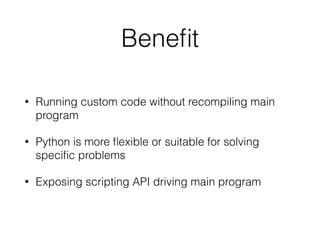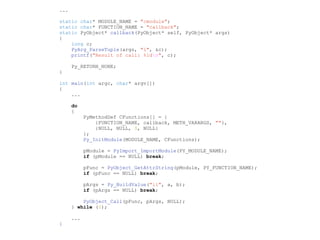Threads and Callbacks for Embedded Python
- 1. Threads and Callbacks for Embedded Python 蔡易⻯⿓龍 Yi-Lung Tsai (Bruce)
- 3. Embedding Python Embed Python interpreter in C/C++, run a script and use the result C/C++ Python Interpreter Python
- 4. Benefit • Running custom code without recompiling main program • Python is more flexible or suitable for solving specific problems • Exposing scripting API driving main program
- 7. First Glance #include <Python.h> int main(int argc, char* argv[]) { Py_Initialize(); PyRun_SimpleString("from time import time, ctimen" "print 'Today is', ctime(time())n"); Py_Finalize(); return 0; }
- 8. http://fannit.com/wp-content/uploads/2014/03/0960a7436008f887aa6bbf0afd34eb722.jpg
- 9. Python/C API • Everything is PyObject* • Symbols with Py prefix
- 10. ... PyObject* sysPath = PySys_GetObject((char*) "path"); PyList_Append(sysPath, PyString_FromString(".")); printf("Input two integers separated by space:n"); int a, b; scanf("%d %d", &a, &b); PyObject *pModule = NULL, *pFunc = NULL, *pArgs = NULL, *pValue = NULL; do { pModule = PyImport_ImportModule("func"); if (pModule == NULL) break; pFunc = PyObject_GetAttrString(pModule, "multiply"); if (pFunc == NULL) break; pArgs = Py_BuildValue("ii", a, b); if (pArgs == NULL) break; pValue = PyObject_Call(pFunc, pArgs, NULL); if (pValue == NULL) break; printf("Result of call: %ldn", PyInt_AsLong(pValue)); } while (0); Py_XDECREF(pValue); Py_XDECREF(pArgs); Py_XDECREF(pFunc); Py_XDECREF(pModule); ...
- 11. Python Program Path ... PyObject* sysPath = PySys_GetObject((char*) "path"); PyList_Append(sysPath, PyString_FromString(“.")); ...
- 12. PyObject Manipulation • Reference Python object as PyObject • Manipulate PyObject • Dereference PyObject
- 13. ... PyObject *pModule = NULL, *pFunc = NULL, *pArgs = NULL, *pValue = NULL; do { pModule = PyImport_ImportModule("func"); if (pModule == NULL) break; pFunc = PyObject_GetAttrString(pModule, "multiply"); if (pFunc == NULL) break; pArgs = Py_BuildValue("ii", a, b); if (pArgs == NULL) break; pValue = PyObject_Call(pFunc, pArgs, NULL); if (pValue == NULL) break; printf("Result of call: %ldn", PyInt_AsLong(pValue)); } while (0); ...
- 14. Data Conversion 1. Convert data values from C to Python 2. Perform a function call to a Python interface routine using the converted values 3. Convert the data values from the call from Python to C
- 15. pArgs = Py_BuildValue("ii", a, b); Format Python type C type s string char* i integer int b integer char l integer long int d float double o object PyObject* () tuple [] list {} dictionary
- 16. Free Resource PyObject* PyDict_New() Return value: New reference. PyObject* PyDict_GetItem(PyObject *p, PyObject *key) Return value: Borrowed reference. Need to decrease reference counting NO need to decrease reference counting
- 17. Multithreading • Python interpreter is not fully thread-safe • Need to deal with global interpreter lock (GIL) • GIL ensures only one Python instruction runs at one time
- 18. C/C++ Python
- 19. class WorkerThread(threading.Thread): def __init__(self, name): super(WorkerThread, self).__init__(name=name) self.stop_event = threading.Event() def run(self): while not self.stop_event.is_set(): print self.name, "is working" time.sleep(1) def stop(self): print self.name, "stop" self.stop_event.set() class ThreadManager(object): def __init__(self): self.worker = WorkerThread("worker") def start_thread(self): self.worker.start() def stop_thread(self): self.worker.stop() self.worker.join()
- 20. PyEval_InitThreads(); ... PyObject *pModule = NULL, *pClass = NULL, *pInst = NULL; do { PyGILState_STATE state = PyGILState_Ensure(); { pModule = PyImport_ImportModule("worker"); if (pModule == NULL) break; pClass = PyObject_GetAttrString(pModule, "ThreadManager"); if (pClass == NULL) break; pInst = PyObject_CallObject(pClass, NULL); if (pInst == NULL) break; PyObject_CallMethod(pInst, "start_thread", NULL); } PyGILState_Release(state); for (int i = 0; i < 5; i++) { printf("main thread is runningn"); sleep(1); } ...
- 22. 1. PyEval_InitThreads(); 2. state = PyGILState_Ensure(); 3. <start thread in Python> 4. PyGILState_Release(state) 5. <main thread in C> main thread acquires GIL main thread acquires GIL main thread acquires GIL no GIL Python thread not run
- 23. PyEval_InitThreads(); ... PyThreadState* save = PyEval_SaveThread(); PyObject *pModule = NULL, *pClass = NULL, *pInst = NULL; do { PyGILState_STATE state = PyGILState_Ensure(); { pModule = PyImport_ImportModule("worker"); if (pModule == NULL) break; pClass = PyObject_GetAttrString(pModule, "ThreadManager"); if (pClass == NULL) break; pInst = PyObject_CallObject(pClass, NULL); if (pInst == NULL) break; PyObject_CallMethod(pInst, "start_thread", NULL); } PyGILState_Release(state); for (int i = 0; i < 5; i++) { printf("main thread is runningn"); sleep(1); } ...
- 24. 1. PyEval_InitThreads(); 2. save = PyEval_SaveThread(); 3. state = PyGILState_Ensure(); 4. <start thread in Python> 5. PyGILState_Release(state) 6. <main thread in C> main thread acquires GIL main thread releases GIL main thread acquires GIL main thread releases GIL no GIL Python thread run
- 25. Multithreading - 2 • Create threads from C • Each C thread calls Python function C P
- 26. int main(int argc, char* argv[]) { PyEval_InitThreads(); Py_Initialize(); PyObject* sysPath = PySys_GetObject((char*) "path"); PyList_Append(sysPath, PyString_FromString(".")); PyThreadState* save = PyEval_SaveThread(); pthread_t tid1, tid2; char* tname1 = "worker1"; char* tname2 = "worker2"; pthread_create(&tid1, NULL, &run_python_function, &tname1); pthread_create(&tid2, NULL, &run_python_function, &tname2); for (int i = 0; i < 5; i++) { printf("main thread is runningn"); sleep(1); } stop_event = 1; pthread_join(tid1, NULL); pthread_join(tid2, NULL); printf("finishn"); PyEval_RestoreThread(save); Py_Finalize(); pthread_exit(NULL); return 0; }
- 27. void* run_python_function(void* arg) { PyGILState_STATE state = PyGILState_Ensure(); PyObject *pModule = NULL, *pFunc = NULL; do { pModule = PyImport_ImportModule("work"); if (pModule == NULL) break; pFunc = PyObject_GetAttrString(pModule, "working"); if (pFunc == NULL) break; char* name = *((char**) arg); while (!stop_event) { PyObject_CallFunction(pFunc, "s", name); } } while (0); Py_XDECREF(pFunc); Py_XDECREF(pModule); PyGILState_Release(state); pthread_exit(NULL); return NULL; } import time def working(name): print name, "is working" time.sleep(1)
- 28. Callback Function • Asynchronous method invocation • Push event to C • Pass heavy computation to C
- 29. static PyObject* callback(PyObject* self, PyObject* args) { long c; PyArg_ParseTuple(args, "l", &c); printf("Result of call: %ldn", c); Py_RETURN_NONE; } int main(int argc, char* argv[]) { ... PyObject *pModule = NULL, *pFunc = NULL, *pArgs = NULL; do { PyMethodDef CFunctions[] = { {"callback", callback, METH_VARARGS, ""}, {NULL, NULL, 0, NULL} }; Py_InitModule("cmodule", CFunctions); pModule = PyImport_ImportModule("func-module"); if (pModule == NULL) break; pFunc = PyObject_GetAttrString(pModule, "multiply"); if (pFunc == NULL) break; pArgs = Py_BuildValue("ii", a, b); if (pArgs == NULL) break; PyObject_Call(pFunc, pArgs, NULL); } while (0); ... }
- 30. Create New Module static PyObject* callback(PyObject* self, PyObject* args) { long c; PyArg_ParseTuple(args, "l", &c); printf("Result of call: %ldn", c); Py_RETURN_NONE; } ... PyMethodDef CFunctions[] = { {"callback", callback, METH_VARARGS, ""}, {NULL, NULL, 0, NULL} }; Py_InitModule("cmodule", CFunctions); ...
- 31. Invoke Python Function ... pModule = PyImport_ImportModule("func-module"); if (pModule == NULL) break; pFunc = PyObject_GetAttrString(pModule, "multiply"); if (pFunc == NULL) break; pArgs = Py_BuildValue("ii", a, b); if (pArgs == NULL) break; PyObject_Call(pFunc, pArgs, NULL); ...
- 32. Import and Use import cmodule def multiply(a, b): print "Will compute", a, "times", b c = 0 for i in range(0, a): c = c + b cmodule.callback(c)
- 33. Callback to C ... static PyObject* callback(PyObject* self, PyObject* args) { long c; PyArg_ParseTuple(args, "l", &c); printf("Result of call: %ldn", c); Py_RETURN_NONE; } ...
- 35. Pure Callback def multiply(a, b, callback): print "Will compute", a, "times", b c = 0 for i in range(0, a): c = c + b callback(c)
- 36. ... PyObject *pCallbackFunc = NULL, *pModule = NULL, *pFunc = NULL, *pArgs = NULL; do { PyMethodDef CFunc = {"callback", callback, METH_VARARGS, ""}; pCallbackFunc = PyCFunction_New(&CFunc, NULL); if (pCallbackFunc == NULL) break; pModule = PyImport_ImportModule("func-callback"); if (pModule == NULL) break; pFunc = PyObject_GetAttrString(pModule, "multiply"); if (pFunc == NULL) break; pArgs = Py_BuildValue("iiO", a, b, pCallbackFunc); if (pArgs == NULL) break; PyObject_Call(pFunc, pArgs, NULL); } while (0); ... CFunction Object
- 39. static PyObject* callback1(PyObject* self, PyObject* args) { char* str; PyArg_ParseTuple(args, "s", &str); printf("%s push eventn", str); Py_RETURN_NONE; } static PyObject* callback2(PyObject* self, PyObject* args) { char* str; PyArg_ParseTuple(args, "s", &str); printf("%s start heavy computingn", str); sleep(5); printf("%s end heavy computingn", str); Py_RETURN_NONE; }
- 40. static PyObject* callback1(PyObject* self, PyObject* args) { char* str; PyArg_ParseTuple(args, "s", &str); printf("%s push eventn", str); Py_RETURN_NONE; } static PyObject* callback2(PyObject* self, PyObject* args) { char* str; PyArg_ParseTuple(args, "s", &str); printf("%s start heavy computingn", str); PyThreadState* save = PyEval_SaveThread(); { sleep(5); } PyEval_RestoreThread(save); printf("%s end heavy computingn", str); Py_RETURN_NONE; }
- 42. Summary • PyObject manipulation in C • GIL in multithreading • CFunction object as callback • Multithreading with callback







![First Glance
#include <Python.h>
int main(int argc, char* argv[])
{
Py_Initialize();
PyRun_SimpleString("from time import time, ctimen"
"print 'Today is', ctime(time())n");
Py_Finalize();
return 0;
}](https://image.slidesharecdn.com/embedpython-150808024732-lva1-app6892/85/Threads-and-Callbacks-for-Embedded-Python-7-320.jpg)







![pArgs = Py_BuildValue("ii", a, b);
Format Python type C type
s string char*
i integer int
b integer char
l integer long int
d float double
o object PyObject*
() tuple
[] list
{} dictionary](https://image.slidesharecdn.com/embedpython-150808024732-lva1-app6892/85/Threads-and-Callbacks-for-Embedded-Python-15-320.jpg)










![int main(int argc, char* argv[])
{
PyEval_InitThreads();
Py_Initialize();
PyObject* sysPath = PySys_GetObject((char*) "path");
PyList_Append(sysPath, PyString_FromString("."));
PyThreadState* save = PyEval_SaveThread();
pthread_t tid1, tid2;
char* tname1 = "worker1";
char* tname2 = "worker2";
pthread_create(&tid1, NULL, &run_python_function, &tname1);
pthread_create(&tid2, NULL, &run_python_function, &tname2);
for (int i = 0; i < 5; i++)
{
printf("main thread is runningn");
sleep(1);
}
stop_event = 1;
pthread_join(tid1, NULL);
pthread_join(tid2, NULL);
printf("finishn");
PyEval_RestoreThread(save);
Py_Finalize();
pthread_exit(NULL);
return 0;
}](https://image.slidesharecdn.com/embedpython-150808024732-lva1-app6892/85/Threads-and-Callbacks-for-Embedded-Python-26-320.jpg)


![static PyObject* callback(PyObject* self, PyObject* args)
{
long c;
PyArg_ParseTuple(args, "l", &c);
printf("Result of call: %ldn", c);
Py_RETURN_NONE;
}
int main(int argc, char* argv[])
{
...
PyObject *pModule = NULL, *pFunc = NULL, *pArgs = NULL;
do
{
PyMethodDef CFunctions[] = {
{"callback", callback, METH_VARARGS, ""},
{NULL, NULL, 0, NULL}
};
Py_InitModule("cmodule", CFunctions);
pModule = PyImport_ImportModule("func-module");
if (pModule == NULL) break;
pFunc = PyObject_GetAttrString(pModule, "multiply");
if (pFunc == NULL) break;
pArgs = Py_BuildValue("ii", a, b);
if (pArgs == NULL) break;
PyObject_Call(pFunc, pArgs, NULL);
} while (0);
...
}](https://image.slidesharecdn.com/embedpython-150808024732-lva1-app6892/85/Threads-and-Callbacks-for-Embedded-Python-29-320.jpg)
![Create New Module
static PyObject* callback(PyObject* self, PyObject* args)
{
long c;
PyArg_ParseTuple(args, "l", &c);
printf("Result of call: %ldn", c);
Py_RETURN_NONE;
}
...
PyMethodDef CFunctions[] = {
{"callback", callback, METH_VARARGS, ""},
{NULL, NULL, 0, NULL}
};
Py_InitModule("cmodule", CFunctions);
...](https://image.slidesharecdn.com/embedpython-150808024732-lva1-app6892/85/Threads-and-Callbacks-for-Embedded-Python-30-320.jpg)











